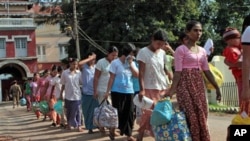Human-rights groups say more than 20 political prisoners being held in the country’s notorious Insein prison began a hunger strike last week protesting inadequate nutrition for all inmates and calling for fundamental rights.
Human-rights groups say at least 33 political prisoners in the notorious Insein prison near Rangoon began a hunger strike last week, when a group of women prisoners protested a government amnesty that reduced overall prison sentences by one year.
Thailand-based rights group Assistance Association for Political Prisoners (AAPP), says the strikers’ demands include better nutrition, improved clothing, ending separation from other prisoners and granting family visiting rights.
The group says authorities have since cracked down on the protesters by sending an unknown number of them to solitary confinement cells no bigger than dog kennels.
Bo Kyi is the joint secretary of the Thailand based Assistant Association for Political Prisoners Burma. “As far as we know some of them are transferred to dog cells. We do not know the detail of the treatment. Some of them were told to prepare their belongings because they might be transferred to the other prisons,” he said.
Bo Kyi says the authorities hope to weaken the protest by breaking up the group and sending them to other prisons. He says the inmates’ families are genuinely concerned about the prisoners’ well being.
“Some of the political prisoners families they really worry for the demonstrator especially their great concern for the way they are treated, very brutally, so that is their concern,” said Kyi.
The prisoner amnesty by the new government in Burma, also known as Myanmar, reduced prison terms by one year, but was widely criticized by human-rights groups as being inadequate.
Rights groups say the government freed about 14,600 prisoners who had less than one year left on their sentences. But only about 55 of those were believed to be political prisoners. There are believed to be more than 2,000 political prisoners behind bars in Burma.
Those detained include more than 200 Buddhist monks and 300 members of the opposition National League for Democracy.
Spokeswoman Debbie Stothard, from a coalition of local rights groups named the Alternative ASEAN Network, says the hunger strike indicates Burma’s rights situation has not improved, despite release of opposition leader Aung San Suu Kyi and the installation of a new civilian government.
“It really emphasizes the urgent need to release all political prisoners immediately and unconditionally. The detention conditions in these jails are actually getting worse, not better, and this is partly one of the reasons why the detainees are on hunger strike. They are simply fed up,” said Stothard.
A statement from the U.S.-based Campaign for Burma described prisons in Burma as “a living hell.” The group accuses authorities of creating conditions that further punish political prisoners. It called for the United Nations and the international community to demand Prime Minister Thein Sein’s new government release all political prisoners as a step to national reconciliation.
Burmese Political Prisoners on Hunger Strike
- By Ron Corben










